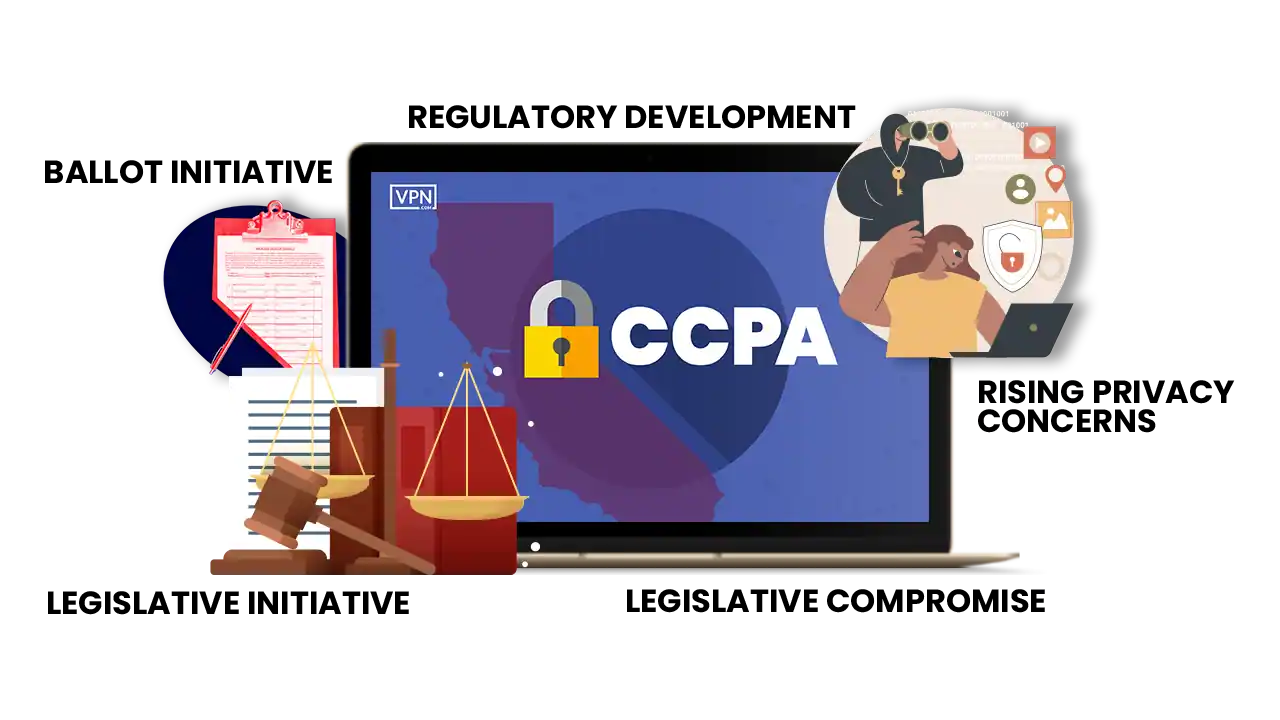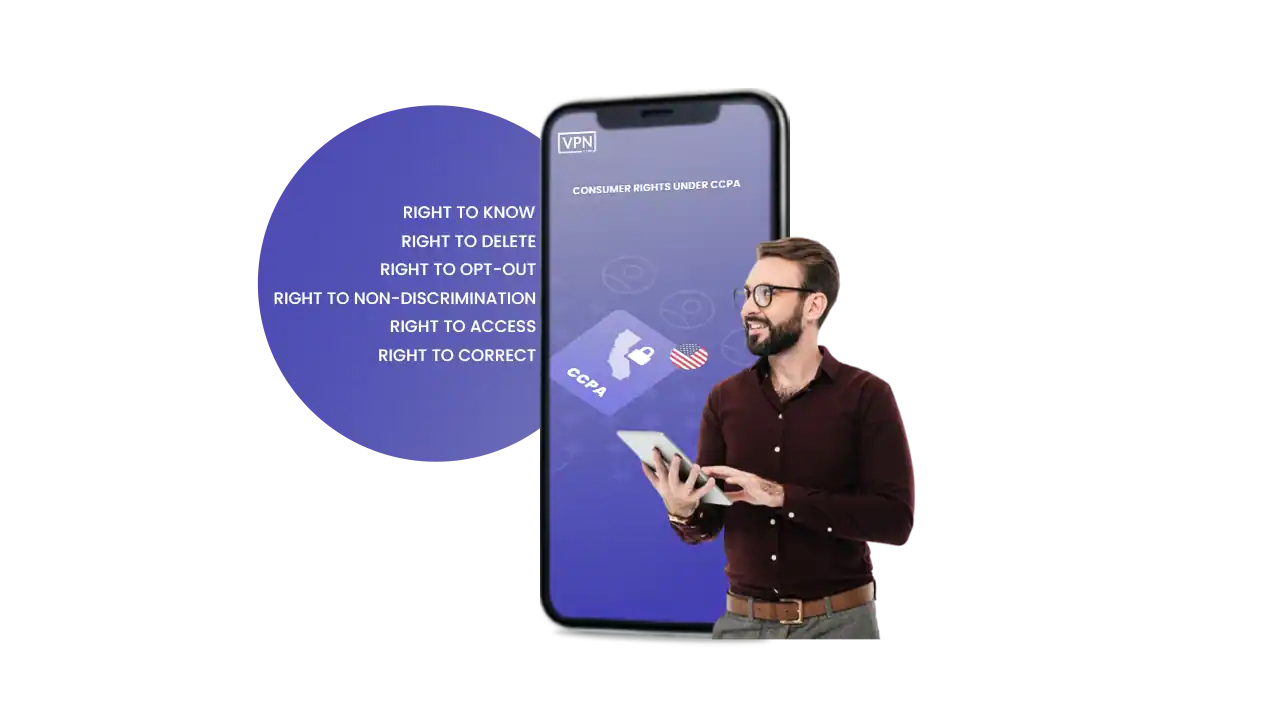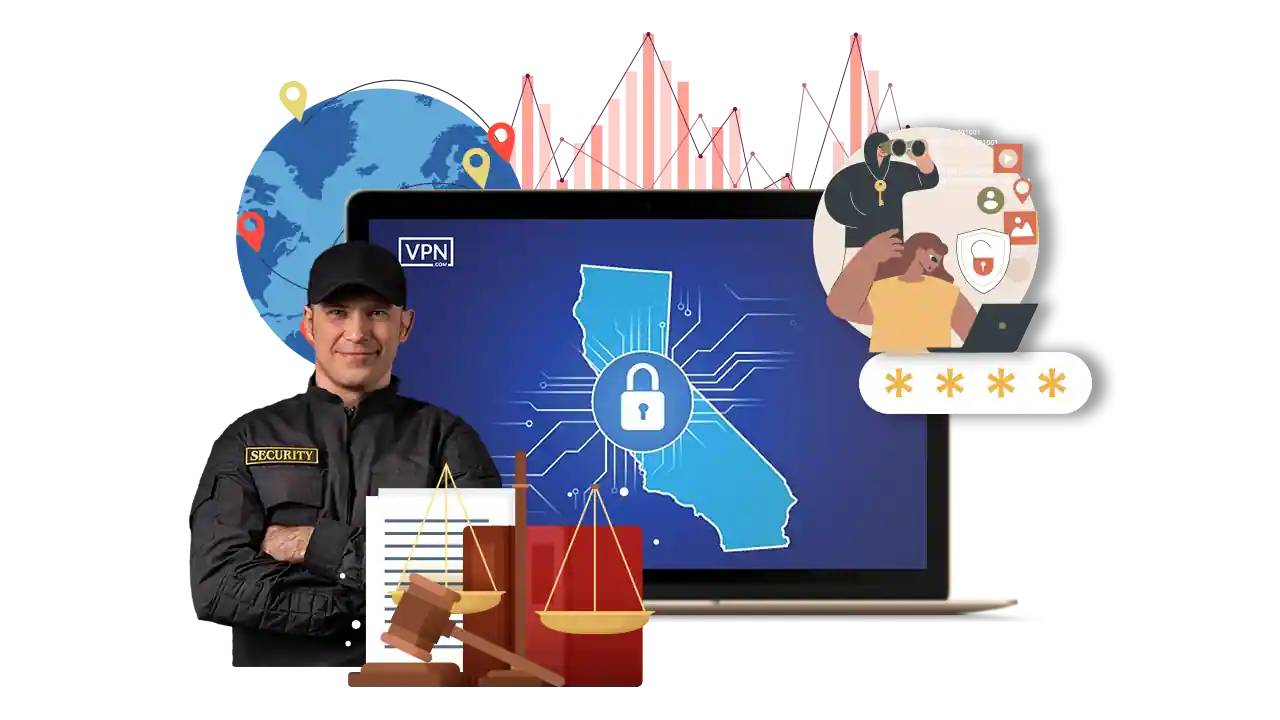Each And Everything You Need To Know About CCPA Regulations In 2024

What is the deal with CCPA? Is CCPA a law or regulation? If you have ever wondered yourself asking this then no need to worry. You are not alone in this journey. You know how we are all constantly sharing our info online these days? Well that is where CCPA comes in. It is California’s way of saying, “Hey, let us make sure people have some control over their personal data”. As someone who has spent way too much time geeking out over privacy laws. We are pumped to share the lowdown on CCPA regulations with you.
CCPA is like a dynamic duo. You have got the law itself, which is like the backbone and then you have got the regulations which are the muscles that make it all work. Together, they are here to give you Californians some serious privacy superpowers.
Now, you might be thinking, “Why should I care about some California law?” Trust me, it is kind of a big deal. We are going to unpack all the juicy details of CCPA regulations. We will also chat about the cool new CCPA regulations we have. So, grab your favorite drink, get cozy and let us dive right in.
Background of CCPA Regulation

The California Consumer Privacy Act (CCPA) was born because of increasing concerns over consumer privacy in today’s digital era. Here is a brief overview of its background. California CCPA regulations was made due to:
Rising Privacy Concerns
The quick growth of the internet and digital services led to increased data collection, and data was collected without asking the consumers. There were data breaches & scandals like the Kaiser Permanente incident, which then increased public concern about their data safety.
Legislative Initiative
Because of these concerns California legislators created a very powerful privacy law to protect the consumers. Assemblymember Ed Chau and Senator Bob Hertzberg introduced the CCPA as Assembly Bill 375 in 2018.
Ballot Initiative
Alastair Mactaggart is a real estate developer and privacy advocate who proposed a ballot initiative called the California Consumer Privacy Act of 2018. This initiative collected some serious support and put pressure on the legislature to act on it.
Legislative Compromise
And to avoid a costly ballot initiative fight. On June 28, 2018, the California legislature enacted the California Consumer Privacy Act. The same day, it received the governor Jerry Brown’s signature. And it was in effect on January 1, 2020.
Regulatory Development
The work of developing regulations to further clarify and apply the California Consumer Privacy Act was given to the California Attorney General’s Office. These regulations went through multiple rounds of public comment and corrections before it was finalized.
What is CCPA?
The California Consumer Privacy Act is a state law with an intention to increase privacy rights and consumer protection for the people of California, USA. It was accepted in 2018 and effective from January 1 2020. The CCPA allows California residents with new rights concerning their personal information. It forces many tasks on businesses to handle such data.
Why Do We Have CCPA?
The California Consumer Privacy Act was ruled to address the growing concerns of consumer privacy in the digital era. Let us tell you some of the reason why it was made:
Enhanced Consumer Privacy
To increase users’ control over their own private data and the ways it is employed by designated businesses.
Transparency
To increase more clarity about data collection practices. This means consumers are informed about what data is being collected and how it is being used.
Consumer Rights
To establish specific consumer rights regarding their personal data. It ensures they take action if their privacy is under threat.
Data Protection
To uplift better data protection practices among businesses and to reduce the risk of data breaches and misuse of personal information.
Consumer Rights Which Are Under CCPA

The CCPA allows their residents some rights concerning their personal information. They now have:
Right to Know
You are entitled to know what private data of yours is being gathered, the sources of that data, the reasons for collecting it and the third parties with whom it is shared.
Right to Delete
You can also request to delete private data that a business has gathered about you.
Right to Opt-Out
You have the right to refuse the sale of your personal information to third parties. Companies must offer a ‘Do Not Sell My Personal Information’ link on their website to ensure this right is accessible to you.
Right to Non-Discrimination
You have the right to be free from punitive actions for exercising your rights under the California Consumer Privacy Act. This prohibits businesses from denying services, varying prices or changing the quality of service because you use your CCPA rights.
Right to Access
You can request to obtain the specific information that a business has gathered over the past year.
Right to Correct
You can request that wrong personal information held by a business be corrected. This right was further expanded under the CPRA which modifies the California Consumer Privacy Act.
Where Does CCPA Apply?
The CCPA applies basically to different businesses who are operating in California. But its scope can extend beyond California because of the nature of digital commerce and data collection around the world. The California Consumer Privacy Act mainly applies to:
Businesses Operating in California
- Any profit making business in California that also collects users personal data.
Businesses Meeting Specific Criteria
- Businesses who’s total annual revenues are more than $25 million.
- Companies that purchase, acquire, sell or distribute the private data of at least 50,000 California residents, households or their devices each year.
- Companies that earn at least 50% of their yearly income from the sale of California residents’ private data.
What is CCPA Regulation?
The CCPA regulation is the detailed guidelines and rules which are developed by the California Attorney General’s Office to clarify and apply the California Consumer Privacy Act. These regulations provide more clarity and specificity on how businesses can obey the California Consumer Privacy Act. They explain the procedures, standards and requirements for applying the rights and duties in the California Consumer Privacy Act.
Key Areas Covered by CCPA Regulations
Provide Notices
They should inform you either at or before the moment your data is collected. To clarify the categories of personal data being collected and the purposes for its usage.
Respond to Consumer Requests
They should also create procedures for receiving, verifying, and even responding to your requests to know, delete, or opt out within specified timeframes, which is usually 45 days.
Update Privacy Policies
They are required to explain your rights and how you can exercise them. This encompasses the types of personal information collected, the purposes for which it is used and the categories of third parties it is shared with.
Implement Opt-Out Mechanisms
Their websites should display a clear and noticeable link titled “Do Not Sell My Personal Information” so that you are facilitated to request it.
Train Employees
They should also make sure that their employees are responsible for handling customer data and are also aware of the CCPA requirements. And how to direct you to exercise your rights.
By starting the CCPA, California had an aim to provide a much more powerful protection. To provide you with more control over your personal data in today’s rapidly changing world.
Enforcement and Penalties
The California Attorney General’s Office applies the CCPA. The fines for those who don’t obey can range from $2,500 for unintentional violations to $7,500 for intentional violations. Also, the CCPA gives users like you a private right of action for certain data breaches, which allows you to sue for legal damages.
The CCPA represents a very big shift in data privacy laws in the United States. And its regulations are continuously evolving to face new privacy challenges every day.
Key Differences Between Law & Regulations
Nature
- CCPA Law: The basic law passed by the legislature.
- CCPA Regulations: Detailed rules and guidelines to apply and explain the law.
Authority
- CCPA Law: Approved by the California state legislature.
- CCPA Regulations: Issued by the California Attorney General’s Office.
Purpose
- CCPA Law: Creates broad rights and obligations.
- CCPA Regulations: Provides specific instructions and clarifications on how to obey the law.
Flexibility
- CCPA Law: More static and can only be changed through policy-making action.
- CCPA Regulations: More dynamic and can be updated or adjusted by the Attorney General to address new issues or clarify existing services.
Example
- CCPA Law: It states that businesses must provide users with a notice at the point of data collection.
- CCPA Regulations: It outlines what information must be included in the notice, how it should be presented and the frequency with which it needs to be updated.
What is the Future of California Consumer Privacy Act?

The future of the California Consumer Privacy Act is shaped by the ongoing developments in privacy law, technology and users expectations. Some key aspects of the future of the CCPA can include:
Enhanced Enforcement
With the creation of the CPPA enforcement of the CCPA and CPRA is expected to become even more strong. The agency will have the authority to investigate violations, impose fines and provide guidance on compliance.
Federal Privacy Legislation
The California Consumer Privacy Act has set an example for state-level privacy laws in the U.S. Which is prompting discussions about a complete federal privacy law. But there is no federal law yet. And increased pressure from many stakeholders may lead to the introduction of national privacy legislation. Which then could mix with privacy standards across states.
Global Influence
The California Consumer Privacy Act has shaped privacy laws beyond the U.S. borders and contributed to the global discourse on data privacy. More countries and regions may look to the California Consumer Privacy Act and CPRA as models when they are developing or updating their own privacy laws.
Technological Advancements
As the technology continues to evolve, the California Consumer Privacy Act will need to change to new data practices and challenges that come with privacy. This may involve updating the law or its regulations to address more emerging technologies like artificial intelligence, the Internet of Things, and biometric data.
Consumer Awareness and Advocacy
Increased users’ awareness and approval for privacy rights will continue to shape the future of the California Consumer Privacy Act as users gain a better understanding of their rights. The businesses will need to prioritize transparency and data protection to maintain trust and command.
Business Adaptation
Businesses will need to stay clever and should adapt to the new privacy landscape. This can include applying solid data protection measures, updating more privacy policies and making sure that the ongoing compliance with both California Consumer Privacy Act and CPRA requirements.
Comparison of CCPA and GDPR
Scope and Applicability
CCPA
- It applies to businesses which are operating in California or serving residents of California.
- Targets for-profit entities meeting certain criteria like businesses with annual revenue over $25 million, which handles the data of 50,000 or more users and who are deriving 50% or more of annual turnover from selling private data.
GDPR
- It covers all companies that process personal data of EU residents, no matter where the company is based.
- Targets all businesses, nonprofits and public authorities if they process personal data.
- No revenue entry and applied universally within the EU.
Consumer Rights
CCPA
- Right to Know.
- Right to Delete.
- Right to Opt-Out.
- Right to Non-Discrimination.
GDPR
- Right to Access.
- Right to Rectification.
- Right to Erasure.
- Right to Restrict Processing.
- Right to Data Portability.
- Right to Object.
- Rights related to Automated Decision-Making.
Penalties for Non-Compliance
CCPA
- Fines can be as high as $2,500 for each unintentional violation and $7,500 for each intentional violation.
- It was enforced mainly by the California Attorney General.
- Very limited private right of action for data breaches.
GDPR
- Has fines up to €20 million or 4% of global annual revenue.
- Was enforced by data protection authorities in each EU member state.
- It is quite a big private right of action for any GDPR violation.
Data Protection Obligations
CCPA
- It requires reasonable security measures.
- Businesses must provide clear notices at the point of data collection.
- Commands businesses to create and update privacy policies.
GDPR
- It requires complete data protection measures.
- Data Protection Officers (DPOs) are necessary for certain organizations.
- It has very detailed requirements for data breach notifications within 72 hours.
- Very large documentation and assessment obligations.
Tips for Consumers under CCPA
Know Your Rights
You yourself should know the rights that are granted to you under CCPA. These are the right to know, the right to delete, the right to opt-out, and the right to non-discrimination.
Review Privacy Policies
You should regularly check the privacy policies of businesses you happen to have interacted with. To help you grasp how your data is gathered, used and shared.
Exercise Your Rights
- You should submit requests to businesses to know what private data they have collected about you.
- If you prefer the business not to have your data anymore, you can ask for its deletion.
- Use the “Do Not Sell My Personal Information” link to stop the sales of data.
Check for Discrimination
You should verify that you are not being discriminated against for using your rights under the CCPA. You can report any example of such differential treatment to the California Attorney General.
Stay Informed
You should keep up with all the updates and changes to the CCPA and related privacy laws to be aware of your rights and any new protections that are there for you.
Use Tools and Resources
You should use online tools and resources to always see your personal data and manage your privacy settings on different platforms you use.
Report Violations
If you think a business is not complying with CCPA regulations then you can submit a complaint to the California Attorney General’s Office.
Be Vigilant with Consent
Always pay attention to consent forms and notices when you are sharing your personal data. Make sure that you understand what you are agreeing to before providing any consent.
Educate Yourself
You should learn more about data privacy and protection so that you can keep your private data safe and sound in the digital age.
Advocate for Privacy
You should also join or support any user advocacy groups that work to increase data privacy protections and hold businesses accountable for their data practices.
Frequently Asked Questions
What is the CCPA Regulations Summary?
The CCPA regulations were issued by the California Attorney General’s Office to provide detailed guidelines on how businesses must obey the CCPA. These regulations cover some key areas which include the requirements for providing notices to users about their data collection practices, the procedures for verifying and responding to consumer requests and the rules for handling data of minors. They also specify how businesses should offer and manage the stop the sales of data and make sure that service providers are also adaptable.
What are the 7 Rights Consumers Have Under the CCPA?
The user has some rights which includes right to know, right to access, right to delete, right to opt-out, right to non-discrimination, right to data portability and also right to correct.
What are the Requirements for CCPA?
In order to obey the CCPA, organizations must follow some requirements. They must provide clear and accessible notices about their data collection practices at or before the point of collection. Businesses need to respond to verified users’ requests to know, access, delete and stop the sale of personal information within specified timeframes. They must also apply reasonable security measures to protect personal data and make sure that service providers also obey the CCPA regulations.
Does CCPA Apply to All States?
No, the CCPA specifically applies to businesses that operate in California or deal with the personal data of California residents. But many businesses which are outside California also choose to obey the CCPA to avoid any possible legal risks and to make sure that consistency is in their data privacy practices across all states.
What is Prohibited Under CCPA?
Under the CCPA, it is prohibited for businesses to sell the private data of users who are under the age of 16. Also businesses are prohibited from victimizing users for exercising their CCPA rights. This includes denying goods or services, charging different prices or rates or even providing a different level or quality of goods or services.
The Bottom Line
Wow, we have covered a lot of ground, haven’t we? From our shiny new CCPA regulations & rights to the hoops businesses have to jump through. We have taken quite the journey through CCPA regulations. We hope that you are feeling a bit more clued in about this whole data privacy thing. Let us tell you again that the CCPA and its regulations are not just some boring legal mumbo-jumbo. They are actually pretty exciting.
These rules are actively changing how our personal information is handled in the digital world. Whether you are a business owner trying to stay on the right side of the law or just someone who wants to know what is happening with your data, this stuff matters.
So, keep asking questions, stay curious and don’t worry when you have to take a stand for your privacy for your privacy and your rights. In this data-driven world we are living in, knowing your stuff is super important.
Customer Reviews for NordVPN: In-Depth Review, Tests, and Stats

Connection issues with MLB.TV
May, 2 2023

Prompt customer service
May, 6 2023

I would highly recommend
December, 15 2023
